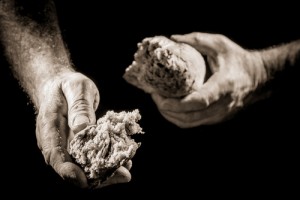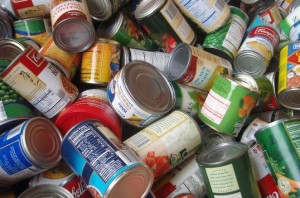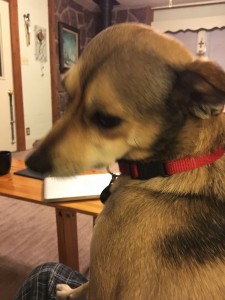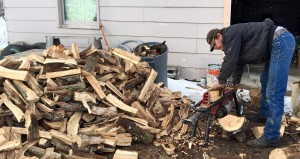It is a cold Sunday morning here on the Rosebud, this Second Sunday after the Epiphany. At 6 a.m., the temperature with the wind chill – and we know wind chill here on the Great Plains – was nearly 30 below zero.
It is so cold that we canceled most of our church services on the Western side of the Rosebud Episcopal Mission. I don’t want our people out in weather that literally can kill you in less than 30 minutes.
But even when we don’t have church services, God is still at work in our lives. 
A few minutes ago, a car pulled into my driveway. If we had had church, I wouldn’t be here at this time, and most of the people know that. But since my car was still parked, still covered in a light dusting of snow, whoever was in that visiting vehicle knew that I most likely was home.
After a few moments of hesitation, the driver got out. She didn’t have a hat. Or gloves. She was holding her way-too-light winter jacket closed with one hand. “You need to zip that up,” I said. “Oh, it doesn’t zip,” she said. “It’s broken.”
I know this woman. She is one of our parishioners here on the Rosebud, a woman who has struggled to hold things together, a woman with children and grandchildren, one of whom has a several physical handicap. This woman needs help, but she hesitates to ask. She doesn’t want to be a burden. Whenever I am with her, I always let her take the lead, because I know how hard it is for her to ask for anything.
“Didn’t we have church this morning?” she asked. “No,” I told her. “We canceled church because of the cold.”
“Um … does the church have any help?” she asked, hesitating every other word.
It turns out they have no food to eat in the house. I’m not surprised. It is mid-month, and it is very cold, and many people do not have enough money for both heat and food.
So I take her into my kitchen, which she does not want to enter because she might track snow onto my linoleum floor. “I don’t care about the floor,” I told her. “It can be washed. Come inside. It’s too cold to stand out there.”
Finally, she enters. I have to encourage her to take more than one step into the kitchen.
“Do you have any food, like bread?” she asks, her head down. I know that she doesn’t want to do this, but she has children. They must eat.
“I don’t have any bread,” I tell her, “because I generally don’t eat bread. But here … I have other food for you.”
I take out four cans of soup, 10 cans of tuna, pasta, couscous, cans of pears and apricots. I give her half of my grapes, most of my bananas, most of my oranges. “Here,” I say, “these have to be eaten. Help me with this.” I see two bags of popcorn someone had given me, as well as some crackers. (“Oh,” she says, “we have crackers.” “Take them,” I say. “You might as well have some more.”) The  large canister of oatmeal has been opened, but I give it to her anyway. It’s mostly full, and the kids will like it. I scour the cabinets for more food her family will eat. “Have you tried quinoa?” I ask. “No. What is it?” she replies. “It’s one of those healthy grains. Easy to make. Just follow the instructions. I like it,” I tell her. In the bags it goes.
large canister of oatmeal has been opened, but I give it to her anyway. It’s mostly full, and the kids will like it. I scour the cabinets for more food her family will eat. “Have you tried quinoa?” I ask. “No. What is it?” she replies. “It’s one of those healthy grains. Easy to make. Just follow the instructions. I like it,” I tell her. In the bags it goes.
Much of the food I give is food I have purchased for just this occasion. People come to my door, sometimes one or two a day, looking for help. I try to keep food on hand that I know they will eat. Cans of fruit, vegetables, soups. Bags of pasta. Boxes of couscous and quinoa. When I have fruit on hand, I always share it with them. I ask them to help me eat it before it goes bad. Our people don’t get enough fruit; it’s frequently too expensive. I try to make sure I always have some on hand for my visitors.
But I have to be careful not to give too much, not to give all that I have. This is a shared meal, as it were, which means that I have to have some food left for myself. The goal is to make sure that everyone has enough. Just that: Enough.
Through it all, my two dogs, Yassa and Bella, are standing there to greet her. She hesitatingly reaches out for them. My dogs are trained to be church dogs, meaning that they are polite and don’t jump, that they greet each person with love. “They’re so soft,” she says, over and over again. “I can’t believe how soft their fur is.” I tell her it is the dog food, keeps them healthy, the same dog food the vet uses. She marvels again at their softness, and their gentleness. “They’re so nice,” she says, stroking Yassa’s fur. (Meanwhile, Bella, who emerged from her blankets, stands shivering. My visitor is concerned: “She’s cold!” I tell her than Bella lives under her blankets in the winter, and that she always shivers when around guests. Bella is a little … well, manipulative that way. She wants every visitor to pick her up and cuddle her. In return, she loves to give kisses. It’s just Bella’s way …) I do not tell my visitor how much the dog food costs; I am too embarrassed to admit I have that kind of money to feed dogs …
As she turns to take the food out to the waiting car, where her daughter and granddaughter are waiting, I ask if they can use some coats. My family and I picked up a lot of them for a giveaway that I am having problems getting organized (it’s complicated, but it will happen).
We go to the front porch and find a new jacket for the woman, one that is warm and will zip up. Then we find one for her smallest child. Then we dig through and get hats and scarves and gloves. “Take what you need,” I say. “It’s for you.” She is hesitant, again. She does not want to take too much, but I know there is a need. “Really,” I say, encouraging her. “Don’t you want some of these scarves? They are hand-made.”
Finally, my visitor takes some of the softest scarves she can find. “If it’s all right …” “Take as many as you need,” I say. “Wouldn’t you like another one? They’re handmade for the oyate (the Lakota people).” “Just one more,” she says. “They’re so soft …”
I peek out the window and see the children in the car already consuming the fruit, smiling as they eat it. Already, this has been a good visit.
Again, we go to the door. I know that she feels she has taken too much.
“Do you have a wood stove?” I ask. “I have wood if you need it.”
Once more, hesitation.
Finally, I get her to agree to take what I have stored in my “secret stash.” (We cut wood for the people here on the Rosebud in our Firewood for the Elders program. While I was away after Christmas, nearly all of it was taken by a few folks who have lost their way when it comes to taking care of all the oyate. But we are cutting more wood, with the help of the community. To learn more about that, see our new website, rosebudepiscopalmission.org, and look under “Our Blog.”)
She and her daughter take the wood that is left, enough to keep them warm at least for another day.
Our new Presiding Bishop, The Most Rev. Michael Curry, has proclaimed that we are part of the Jesus Movement. That we are the ones who are called to live out the Gospel of love and inclusion every single day of our lives. That we are the ones who can change the world by our words and deeds.
No, we didn’t have church this morning on the Rosebud West. It was too cold.
Instead, we – a visitor and myself, as well as my two dogs – had church in my kitchen. Where we broke bread together by sharing our food. And on my front porch. Where we shared from the abundance of cold-weather gear.
This is the Jesus Movement. This is God in action.
Our collect for today, the Second Sunday after the Epiphany:
Almighty God, whose Son our Savior Jesus Christ is the light of the world: Grant that your people, illumined by your Word and Sacraments, may shine with the radiance of Christ’s glory, that he may be known, worshiped, and obeyed to the ends of the earth; through Jesus Christ our Lord, who with you and the Holy Spirit lives and reigns, one God, now and for ever. Amen.








